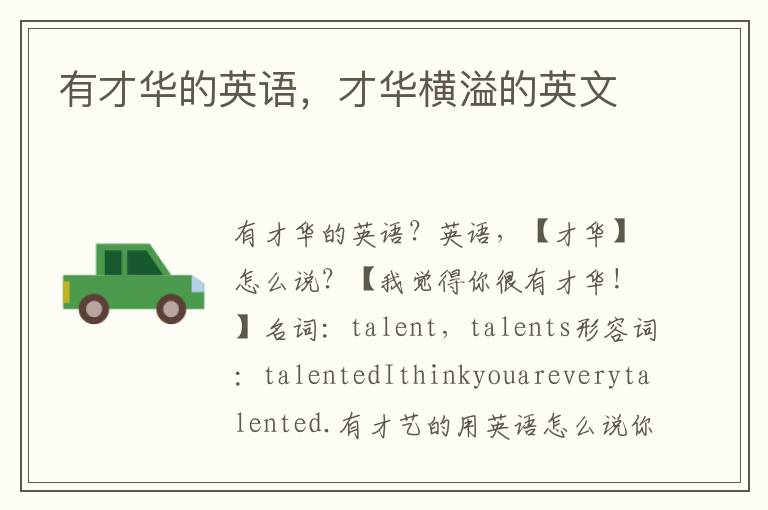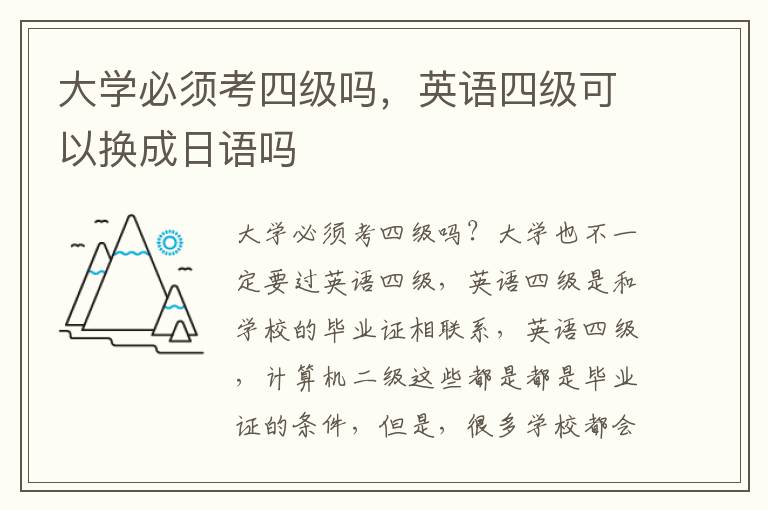【简介】感谢网友“雕龙文库”参与投稿,这里小编给大家分享一些,方便大家学习。
英语中的名词按其表示的事物性质的不同可分为可数名词与不可数名词。这两种名词在用法上是有区别的,现归纳如下:
一、可数名词有单数、复数之分,如:
map→maps;onion→onions;baker→bakers
不可数名词没有复数形式,只有单数形式。如:
some water;a lot of bread
二、单数可数名词表示泛指时,前面要用不定冠词a(an);而不可数名词不能用a(an)。如:
Li Hong is a driver.I am a teacher.李红是一名司机,我是一名教师。
We can’t see milk on the table.我们看不见桌上有牛奶。
[友情提醒]在表示特指时,不可数名词和可数名词前都要用定冠词the,如:
Pass me the ball,please.请把球传给我。
The chicken on the plate is yours.盘子里的鸡肉是你的。
三、可数名词表示复数意义时可用many等词修饰。如:
many apples;a lot of tomatoes;a few pens
不可数名词则要用much、a little等词修饰。如:
much meat a little breadlittle water
[友情提醒]这两类名词都可以被some、any、a lot of(lost of)等修饰。如:some eggs/paper(纸)。
A lot of (lots of) knives/orange juice
四、可数名词前通常可用具体的数词来修饰。如:
three women
ten babies
不可数名词表示数量的多少时,必须与表示数量的名词连用,即“数词+表示数量的名词(可数名词)+of+不可数名词”。如:
two glasses of milk 两杯牛奶
five pieces of bread 五片面包
五、可数名词作主语时,谓语动词的单、复数与主语的单、复数须保持一致。不可数名词作主语时,谓语动词只能用单数形式。如:
There is some rice in the bowl.碗里有些米饭。
All the students are in the classroom.所有的学生都在教室里。
[友情提醒]如果不可数名词前有复数名词短语修饰时,谓语动词须用复数形式。如:
There are two bags of rice in the room.房间里有两袋大米。
六、对可数名词的数量提问用how many;对不可数名词的数量提问要用how much,但对不可数名词前表示数量名词中的修饰语提问时要用how many。
如:
I can see two pictures on the wall. → How many pictures can you see on the wall?
There is a lot of pork in the basket. → How much pork is there in the basket?
I want three glasses of water. → How many glasses of water do you want?
七、另外,有些集合名词也是可数名词,但不同的是,它们以单数形式出现,表示复数概念,如people,police,family等;而有些可数名词本身就以复数形式出现,如clothes,glasses(眼镜)等;有的可数名词单、复数形式相同,如Japanese,sheep,Chinese等。如:
The Chinese people are hardworking and brave.中国人民勤劳勇敢。
The sports clothes are new.这些运动服是新的。
I have one sheep. He has two sheep.我有一只羊,他有三只羊。
英语中的名词按其表示的事物性质的不同可分为可数名词与不可数名词。这两种名词在用法上是有区别的,现归纳如下:
一、可数名词有单数、复数之分,如:
map→maps;onion→onions;baker→bakers
不可数名词没有复数形式,只有单数形式。如:
some water;a lot of bread
二、单数可数名词表示泛指时,前面要用不定冠词a(an);而不可数名词不能用a(an)。如:
Li Hong is a driver.I am a teacher.李红是一名司机,我是一名教师。
We can’t see milk on the table.我们看不见桌上有牛奶。
[友情提醒]在表示特指时,不可数名词和可数名词前都要用定冠词the,如:
Pass me the ball,please.请把球传给我。
The chicken on the plate is yours.盘子里的鸡肉是你的。
三、可数名词表示复数意义时可用many等词修饰。如:
many apples;a lot of tomatoes;a few pens
不可数名词则要用much、a little等词修饰。如:
much meat a little breadlittle water
[友情提醒]这两类名词都可以被some、any、a lot of(lost of)等修饰。如:some eggs/paper(纸)。
A lot of (lots of) knives/orange juice
四、可数名词前通常可用具体的数词来修饰。如:
three women
ten babies
不可数名词表示数量的多少时,必须与表示数量的名词连用,即“数词+表示数量的名词(可数名词)+of+不可数名词”。如:
two glasses of milk 两杯牛奶
five pieces of bread 五片面包
五、可数名词作主语时,谓语动词的单、复数与主语的单、复数须保持一致。不可数名词作主语时,谓语动词只能用单数形式。如:
There is some rice in the bowl.碗里有些米饭。
All the students are in the classroom.所有的学生都在教室里。
[友情提醒]如果不可数名词前有复数名词短语修饰时,谓语动词须用复数形式。如:
There are two bags of rice in the room.房间里有两袋大米。
六、对可数名词的数量提问用how many;对不可数名词的数量提问要用how much,但对不可数名词前表示数量名词中的修饰语提问时要用how many。
如:
I can see two pictures on the wall. → How many pictures can you see on the wall?
There is a lot of pork in the basket. → How much pork is there in the basket?
I want three glasses of water. → How many glasses of water do you want?
七、另外,有些集合名词也是可数名词,但不同的是,它们以单数形式出现,表示复数概念,如people,police,family等;而有些可数名词本身就以复数形式出现,如clothes,glasses(眼镜)等;有的可数名词单、复数形式相同,如Japanese,sheep,Chinese等。如:
The Chinese people are hardworking and brave.中国人民勤劳勇敢。
The sports clothes are new.这些运动服是新的。
I have one sheep. He has two sheep.我有一只羊,他有三只羊。








